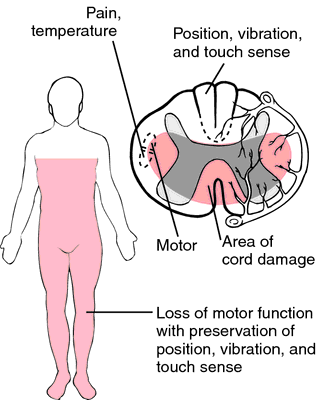A diver shows up to your trauma bay in a c-collar and with complete motor paralysis of legs, torso, hands and weakness of shoulder muscles. He has no sensation to pain or temperature below his clavicles. His proprioception is intact. Which level spinal cord lesion is this? What is the diagnosis?
ANSWER: Anterior cord syndrome @ C5
Anterior cord syndrome entails loss of pain and temperature below the level of the lesion, motor paralysis below the level of the lesion, urinary retention, anal sphincter flaccidity, and possible autonomic dysfunction. Posterior column functions of proprioception and vibration remain intact. This lesion may be surgically correctable so immediate neurosurgical consultation should be placed. Anterior cord syndrome occurs secondary impaired blood supply to the anterior spinal cord usually due to trauma resulting from a flexion injury (such as diving or severe whiplash). This causes cord contusion, protrusion of a bony fragment or herniated disc into the spinal canal or laceration or even thrombosis of the anterior spinal artery. Anterior cord syndrome can also result from prolonged cross-clamping of the aorta.


Some other frequently tested spinal chord injuries:
Brown-Sequard syndrome: ispilateral motor, position and vibration loss and contralateral pain and temperature loss due to hemi-section of the spinal cord that most commonly occurs from penetrating injury to the spine. May also occur secondary to a compressive lesion or lateral mass fractures of the cervical spine.
Cauda equina syndrome: most common symptom is urinary retention. Other symptoms include saddle anesthesia, loss of bladder control, impotence, and unilateral increased flaccidity in the lower extremities. Happens when cauda equina is compressed by a herniated disc, tumor, mass, or abscess.
Central cord syndrome: upper extremity weakness that is greater then lower extremity weakness, sensory changes often greater in the upper extremities, and urinary retention. Happens when ligamentum flavum buckles into the cord resulting in concussion of the central grey matter in the central most portion of the pyramidaland spinothalamic tracts. It is often the result of a hyperextension injury in an elderly patient.
http://www.apparelyzed.com
http://medical-dictionary.thefreedictionary.com/anterior+cord+syndrome
Kaji AH, Newton EJ, Hockberger RS. Spinal Injuries: in Marx JA, Hockberger RS, Walls RM, et al (eds): Rosen’s Emergency Medicine: Concepts and Clinical Practice, ed 8. Philadelphia, Saunders, 2014, (Ch) 43:p 382-420.
